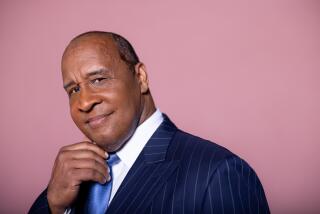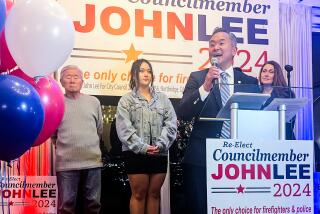Some Say Vincent Is Home Safe; Others Say He’s Out on a Limb
- Share via
Inglewood Mayor Edward Vincent emerged from the state attorney general’s investigation of his finances this week with a political base that is either rock solid or slowly crumbling, depending on whom you ask.
Vincent’s supporters say that Inglewood’s dominant politician suffered no significant political damage from the lawsuit filed by the attorney general, which was resolved Wednesday when the mayor agreed to pay $4,851.69 in civil penalties but admitted no wrongdoing. The suit alleged that Vincent had billed both the city and his campaign for several trips and spent campaign funds for personal uses such as truck repairs, clothes and a veterinarian’s bill.
As proof that Vincent has survived unscathed, supporters point to his $500-a-plate fund-raising dinner last Friday in Beverly Hills, which attracted an array of political powerhouses, including Assembly Speaker Willie Brown (D-San Francisco).
Vincent, 54, who became the city’s first black mayor in 1983, was also joined at the dinner by Los Angeles City Councilman Nate Holden, Assembly members Maxine Waters (D-Los Angeles) and Curtis Tucker Jr. (D-Inglewood), and representatives from the Forum, Western Waste and other corporate backers. Vincent is regarded as an aggressive fund-raiser who is well-connected to other prominent black politicians in the region and around the state.
“I hope you will continue to be a beacon and a light for all of us,” Brown told the mayor last Friday night. “. . . I look forward to making your political career . . . even more successful in the future.”
Percy Pinkney, a Vincent supporter who is an aide to Los Angeles Councilman Robert Farrell, said Vincent came out ahead in the attorney general’s investigation because it taught him valuable lessons about campaign finance laws and what Pinkney called the more intense scrutiny that black politicians face.
Feels Disgust, Not Relief
Vincent said in an interview Thursday that he feels no relief that the state’s lawsuit is over, only disgust that it began in the first place.
“When you’re out there giving everything you’ve got, it’s a hell of a thing when people are out there maligning you.” He denied any wrongdoing and said he became a test case for confusing state campaign laws.
“I feel good about what I’ve done as mayor,” Vincent said. “I just feel bad about what I’ve had to go through.”
Although Vincent detractors acknowledge that the second-term mayor is a formidable political opponent who escaped the attorney general’s suit without much reaction from residents, they say his political influence in Inglewood is on the decline.
“The voters in Inglewood tend not to care about (allegations of financial improprieties),” said W. R. (Tony) Draper, a Vincent critic who was soundly defeated when he ran against the mayor in 1986. “People think that politicians are always doing that.”
‘Good Local Politician’
Draper summed up Vincent’s political score card this way: “I don’t think he could ever win a state election. He is a good local politician. He has some people who will support him no matter what.”
The mayor’s critics point to several factors to illustrate what they see as Vincent’s vulnerability:
In 1987, voters overwhelmingly defeated a ballot initiative that would have made Vincent a full-time mayor and more than quadrupled his $10,500 annual salary to $49,621. Seventeen percent of Inglewood’s voters went to the polls and defeated the measure by 62%. The outcome, less than six months after Vincent won reelection with 80% of the vote, was considered a major defeat for Vincent’s political organization, which campaigned vigorously for the ballot.
More recently, Vincent, who had backed John Gibbs for the City Council and the late Caroline Coleman for school board in the June runoff elections, saw both his candidates go down to defeat. Coleman died before the runoff, but her name remained on the ballot and Vincent continued his support in what some call a political blunder. Despite Vincent’s support, Gibbs was narrowly defeated by incumbent Councilman Daniel Tabor.
Although the attorney general’s lawsuit has been settled, the mayor’s finances are still under investigation. The state Fair Political Practices Commission said this week that it is still investigating the mayor’s failure to itemize or explain about $50,000 in campaign travel spending since 1983.
Vincent suffered a blow May 24 when the state Supreme Court upheld the annulment of the 1987 council election of Ervin (Tony) Thomas, whom the mayor backed. A Los Angeles Superior Court judge had ordered a new election, in part because witnesses testified that the mayor committed Election Code violations involving absentee ballots.
Runoff Battle May Be Key
The mayor’s future political strength may depend largely on the results of the Oct. 3 runoff election between Thomas and his challenger from 1987, Garland Hardeman, according to some of the city’s political observers. Vincent is strongly supporting Thomas, whom the mayor introduced with praise at his fund-raising dinner. Hardeman has made no secret of his disdain for Vincent’s leadership and is widely believed to be a potential rival for Vincent’s seat in November, 1990.
Vincent said his vocal critics often drown out the many Inglewood residents who recognize how the city has improved under his leadership.
“There’s over 100,000 people in this city that are happy,” he said, referring to the city’s population of slightly more than 100,000 residents. “They know what’s going on. They aren’t the so-called critics. The critics are criticizing everything. They’ll never be pleased.”
The mayor’s backers see Vincent as a politician on the rise. They say that a quick look at the guest list to the mayor’s fund-raising event shows that his support among the powerful has not eroded a bit.
“I think that Mayor Vincent’s future is unlimited,” Pinkney said. “I feel strongly that he will go beyond being mayor. Someday we will see Ed Vincent in Sacramento or maybe even in Congress.”
Vincent has typically been one of the South Bay’s best-financed local officials, but his most recent campaign statement shows that expenses and debts of more than $30,000 left his campaign fund with less than $2,000 in net cash at the end of June. The mayor’s critics concede, however, that Vincent has plenty of time to solidify his political war chest by reelection time. Vincent said he did not know yet how much his campaign took in at the fund-raising dinner.
Likely Rallying Cry
In a speech at the dinner, Vincent foreshadowed what some in attendance said is likely to become his rallying cry during next fall’s mayoral race.
“When I first came into office, Inglewood was stagnant,” he said. “We had prostitutes on the street, gangs running rampant, narcotics being sold on the street corners . . . people didn’t feel safe in their homes. Today we’re an All-America City.”
The lavish praise from Brown and others was more than fleeting political rhetoric, the mayor’s allies maintain. Although politicians are no longer able to transfer funds to other candidates from their campaign fund, Vincent will benefit because of the strong influence the elected officials have on those who can contribute, one Vincent supporter said.
“Brown is like the Godfather,” the Vincent backer said. “With Willie in his corner, Vincent can’t lose.”
But Ken Gossett, an Inglewood businessman and Vincent critic, said the attendance list at a fund-raising dinner more than a year before an election does not show much at all.
“I don’t think you can read anything into the dinner,” he said. “(The politicians) were invited and they wanted a free dinner. It’s political back-rubbing.”
WHAT OTHERS SAY ABOUT MAYOR VINCENT
Speaker Willie Brown
‘I hope you (Vincent) will continue to be a beacon and a light for all of us. I look forward to making your political career . . . even more successful in the future.’
W.R. (Tony) Draper
‘The voters in Inglewood tend not to care about (allegations of financial improprieties). People think that politicians are always doing that.’
More to Read
Sign up for Essential California
The most important California stories and recommendations in your inbox every morning.
You may occasionally receive promotional content from the Los Angeles Times.













